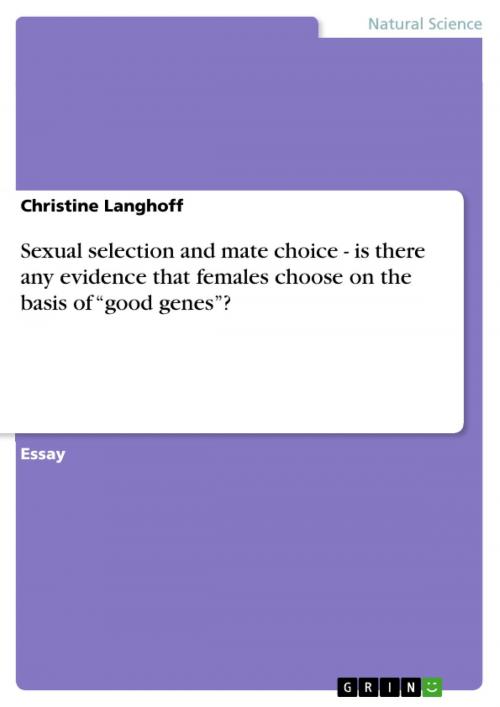Sexual selection and mate choice - is there any evidence that females choose on the basis of 'good genes'?
is there any evidence that females choose on the basis of 'good genes'?
Nonfiction, Science & Nature, Science, Biological Sciences, Physiology| Author: | Christine Langhoff | ISBN: | 9783638870207 |
| Publisher: | GRIN Publishing | Publication: | December 4, 2007 |
| Imprint: | GRIN Publishing | Language: | English |
| Author: | Christine Langhoff |
| ISBN: | 9783638870207 |
| Publisher: | GRIN Publishing |
| Publication: | December 4, 2007 |
| Imprint: | GRIN Publishing |
| Language: | English |
Essay from the year 2002 in the subject Biology - Behaviour, grade: 2.1, Oxford Brookes University, 3 entries in the bibliography, language: English, abstract: The 'good gene' hypothesis is one of the main hypotheses regarding sexual selection by female mate choice. Sexual selection was first defined by Darwin as 'the advantage which certain individuals have over others of the same sex and species, in exclusive relation to reproduction'. He devised sexual selection theory to account for the evolution of survival-decreasing traits, which nevertheless increase individual reproductive success by enabling individuals to acquire mates in competition with others. Sexual selection consists of two components, one arising when the members of one sex compete for mates (often called intrasexual selection) and the other occurring when members of the choosier sex determine which members of the other sex will have a chance to mate (often called intersexual selection). The good gene hypothesis is concerned with the latter or rather with the evolution of female preferences for male traits. First, I am going to outline the main components of the good gene hypothesis and then I am going to explore whether there is any evidence that females choose on the basis of 'good genes'.
Essay from the year 2002 in the subject Biology - Behaviour, grade: 2.1, Oxford Brookes University, 3 entries in the bibliography, language: English, abstract: The 'good gene' hypothesis is one of the main hypotheses regarding sexual selection by female mate choice. Sexual selection was first defined by Darwin as 'the advantage which certain individuals have over others of the same sex and species, in exclusive relation to reproduction'. He devised sexual selection theory to account for the evolution of survival-decreasing traits, which nevertheless increase individual reproductive success by enabling individuals to acquire mates in competition with others. Sexual selection consists of two components, one arising when the members of one sex compete for mates (often called intrasexual selection) and the other occurring when members of the choosier sex determine which members of the other sex will have a chance to mate (often called intersexual selection). The good gene hypothesis is concerned with the latter or rather with the evolution of female preferences for male traits. First, I am going to outline the main components of the good gene hypothesis and then I am going to explore whether there is any evidence that females choose on the basis of 'good genes'.















